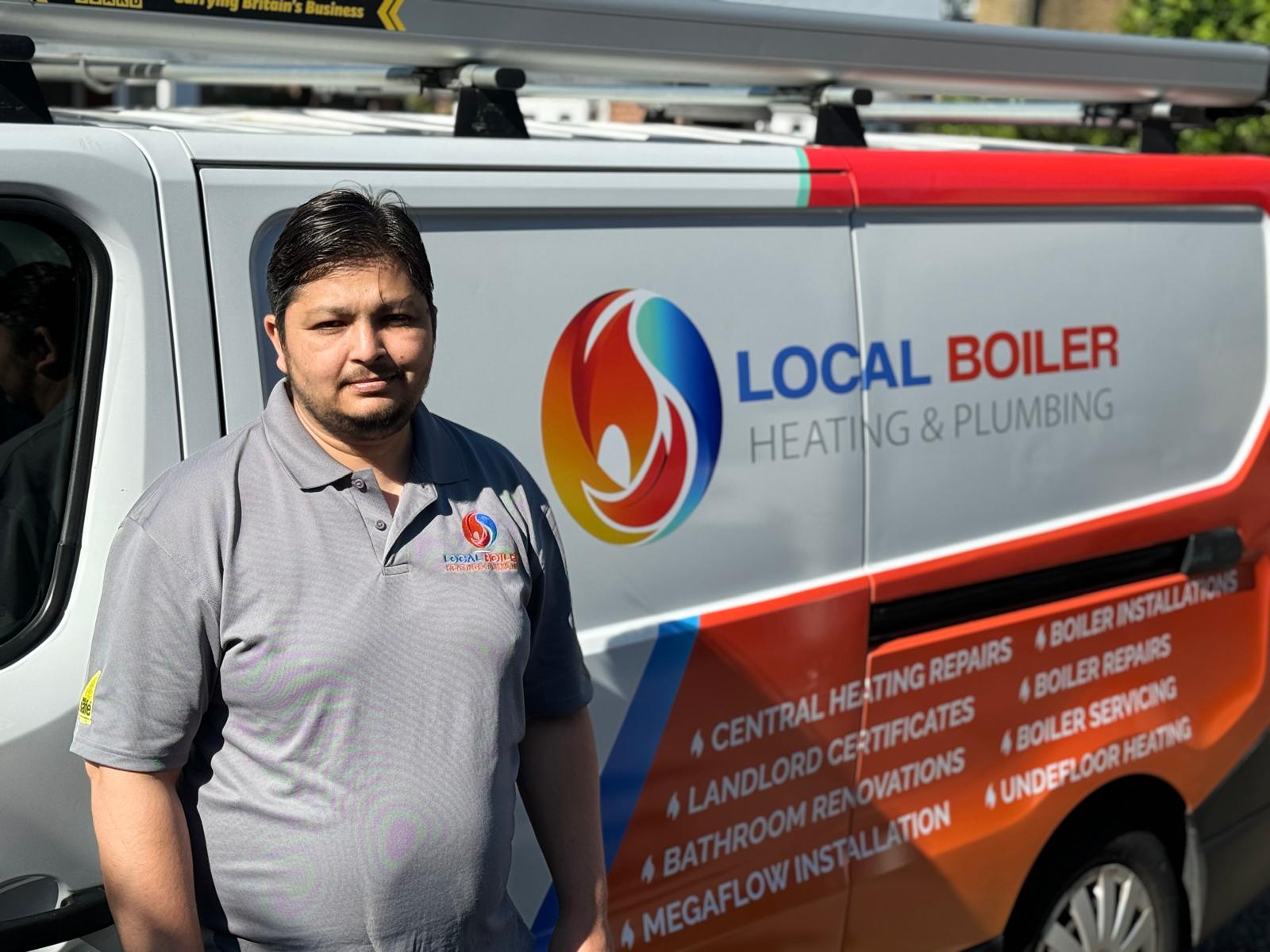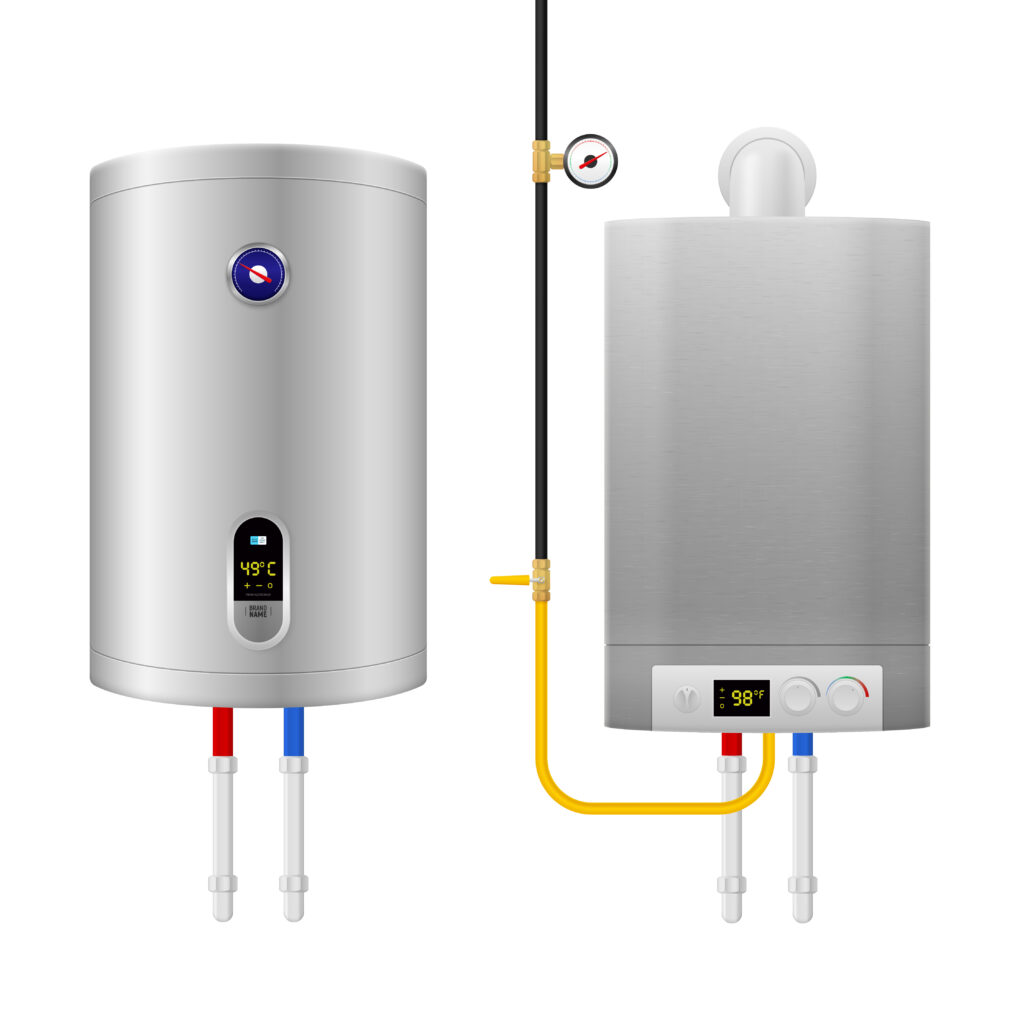Efficiently heating your home doesn’t come cheap. As a UK homeowner, one of the most important and potentially money-saving decisions you can make for your property is choosing the right boiler. However, the combi boiler vs system boiler dilemma remains a source of confusion for many households across the country, with each option having unique benefits for certain situations.
Knowing the key differences between these two heating systems can not only save you thousands of pounds over the lifetime of your boiler but also ensure your home is always comfortably heated throughout the UK’s fickle climate. This complete guide will take you through everything you need to know about both combi and system boilers to help you make the best choice for your home and family’s needs.
Understanding Combi Boilers: The Space-Saving Solution
A combination boiler, also known as a combi boiler, is the most common type of boiler system in the UK, making up around 70% of new boiler installations. They are small, wall-mounted units that provide both central heating and domestic hot water in a single device without requiring a hot water cylinder or cold water storage tank.
Combi boilers work by heating water directly from the mains supply on demand. When a hot water tap is opened, the boiler’s heat exchanger warms the cold water instantly, providing an immediate supply of hot water. There is no need to store pre-heated water, making combi ideal for smaller homes with limited space.
Condensing combi boilers, the most modern type, are highly efficient, as they capture and re-use the heat from flue gases that would otherwise be lost through the boiler’s flue. This can increase efficiency to as much as 94%, helping to lower carbon emissions and energy bills.
Inside a combi boiler, you will find a primary heat exchanger for the central heating system, a secondary heat exchanger for hot water, a three-way diverter valve to switch between central heating and hot water supply, and control systems to manage the boiler’s operation efficiently under different demand conditions.
System Boilers Explained: The Traditional Powerhouse
System boilers, also known as sealed system boilers, have a number of components, including the expansion vessel and circulation pump built in, but unlike combi boilers they require a separate hot water storage cylinder, usually housed in an airing cupboard or dedicated utility room.
A system boiler heats water in the boiler before sending it to an insulated cylinder, storing it until it is needed. Stored hot water can be supplied to more than one tap and appliance at a time, without the hot water becoming cold or the water pressure dropping, so system boilers are often more suitable for larger homes where the simultaneous use of hot water is more common. System boilers are often used with solar thermal panels, because the hot water is stored.
The panels heat water which can be used to replace the hot water in the cylinder which is being used, cutting down on the use of fossil fuels. The system is called a sealed system, because it does not need a cold water storage tank in the loft space, which makes it easier to install, but it still has the benefit of storing hot water. System boilers have better controls, and many modulate their output according to the demand for heat.
Performance Comparison: Hot Water Delivery and Heating Efficiency
Hot Water Performance Analysis
Combi Boiler Hot Water Delivery:
- Flow rates typically range from 10-15 litres per minute depending on incoming mains pressure
- Instantaneous heating means no waiting time for hot water to reach taps
- Performance directly correlates with mains water pressure and incoming temperature
- Single outlet usage provides optimal performance
- Multiple simultaneous outlets may experience reduced flow rates and temperature fluctuations
System Boiler Hot Water Performance:
- Stored hot water allows multiple outlets to operate simultaneously without pressure loss
- Flow rates determined by cylinder size and pump specifications rather than boiler capacity
- Consistent temperature maintenance across all outlets during peak demand periods
- Requires recovery time to reheat cylinder contents after depletion
- Superior performance for homes with multiple bathrooms and high simultaneous usage
Central Heating Efficiency
Both systems excel in central heating provision, though their approaches differ significantly. Combi boilers switch between heating and hot water modes, potentially causing brief interruptions to central heating during hot water usage. However, modern combis feature priority systems that minimise these disruptions.
System boilers can provide central heating and hot water simultaneously, as the stored hot water doesn’t interfere with the heating circuit. This capability ensures consistent room temperatures even during periods of high hot water usage.
Installation Requirements and Space Considerations
Combi Boiler Installation Factors
Space Requirements:
- Single wall-mounted unit typically measuring 700mm x 400mm x 300mm
- No additional storage requirements
- Ideal for flats, terraced houses, and properties with limited space
- Can be installed in kitchens, utility rooms, or dedicated boiler cupboards
Installation Considerations:
- Requires adequate gas supply and electrical connections
- Flue positioning must comply with Building Regulations
- Mains water pressure must be sufficient for optimal performance
- Existing pipework modifications may be necessary when replacing conventional systems
System Boiler Installation Requirements
Space Allocation:
- Boiler unit plus separate hot water cylinder (typically 150-300 litres capacity)
- Cylinder requires airing cupboard or dedicated space with adequate ventilation
- Total footprint significantly larger than combi installations
- Suitable for houses with dedicated plant rooms or utility spaces
Installation Specifications:
- More complex pipework between boiler and cylinder
- Requires zone valves and additional controls for optimal efficiency
- Cylinder insulation crucial for maintaining efficiency
- Professional sizing calculations essential for matching boiler output to cylinder capacity
Cost Analysis: Purchase, Installation, and Operating Expenses
Initial Investment Comparison
The upfront costs for boiler systems vary considerably based on system complexity and installation requirements. Combi boilers generally present lower initial costs due to their simplified installation process and reduced component requirements.
Combi Boiler Costs:
- Unit prices range from £800-£2,500 depending on brand and efficiency rating
- Installation typically costs £1,500-£3,000 for straightforward replacements
- Conversion from conventional systems may require additional pipework modifications
- Total project costs generally range from £2,300-£5,500
System Boiler Investment:
- Boiler units priced between £1,000-£3,000 depending on specifications
- Hot water cylinder costs £300-£800 for quality insulated models
- Installation expenses £2,000-£4,000 due to increased complexity
- Total system costs typically range from £3,300-£7,800
Long-term Operating Costs
Efficiency plays a significant role in long-term operating costs, so this is a crucial factor for cost-conscious homeowners to consider. Both systems can achieve high efficiency ratings, but they have different operating characteristics.
Combi boilers have no standing heat losses from stored hot water, which could lead to lower energy use for households with a low demand for hot water. However, the instantaneous heating process may consume more gas if there are frequent hot water demands.
System boilers with well-insulated cylinders can retain stored hot water effectively, especially in homes with predictable usage patterns. Heating water during off-peak times with economy tariffs can offer additional savings for eligible households.
Pros and Cons: Detailed Analysis for Informed Decision-Making
Combi Boiler Advantages
Space Efficiency Benefits:
- Eliminates need for hot water cylinders and cold water tanks
- Frees up valuable storage space in airing cupboards
- Ideal for modern open-plan living arrangements
- Minimal visual impact in kitchen installations
Convenience and Performance:
- Instantaneous hot water delivery without waiting periods
- Unlimited hot water supply (within flow rate limitations)
- Lower initial installation costs for most properties
- Simplified system with fewer components to maintain
Energy Efficiency Features:
- No standing heat losses from stored water
- Only heats water when required
- Advanced modulation reduces energy wastage
- Compact design reduces heat loss through pipework
Combi Boiler Limitations
Performance Constraints:
- Flow rate limitations may frustrate households with high simultaneous demand
- Performance dependent on mains water pressure and temperature
- Cannot supply multiple outlets at full capacity simultaneously
- Shower performance may suffer during peak usage periods
System Vulnerabilities:
- Single point of failure affects both heating and hot water
- Complex internal components may require specialist repairs
- Unsuitable for properties with poor mains pressure
- Limited compatibility with renewable energy systems
System Boiler Advantages
Superior Hot Water Performance:
- Excellent flow rates to multiple outlets simultaneously
- Consistent temperature maintenance during peak demand
- Large storage capacity suits households with high usage
- Compatible with power showers and multiple bathroom installations
System Reliability:
- Separate heating and hot water circuits improve reliability
- Hot water availability during boiler maintenance periods
- Excellent compatibility with solar thermal systems
- Proven technology with established repair networks
Flexibility and Integration:
- Works effectively with underfloor heating systems
- Supports zoned heating controls for improved efficiency
- Compatible with thermal stores and heat pumps
- Suitable for properties with complex heating requirements
System Boiler Disadvantages
Space and Installation Issues:
- Requires significant space for cylinder installation
- More complex installation with higher costs
- Standing heat losses reduce overall efficiency
- Potential for running out of hot water during high demand periods
Maintenance and Operational Considerations:
- Regular cylinder maintenance required
- More components increase potential failure points
- Higher initial investment requirements
- Cylinder replacement may be necessary over system lifetime
Property Suitability: Matching Systems to Home Characteristics
Ideal Combi Boiler Applications
Property Types:
- Flats and apartments with limited space
- Small to medium-sized houses (1-3 bedrooms)
- Properties with single bathroom installations
- Homes with good mains water pressure (minimum 1.5 bar)
Household Characteristics:
- 1-4 occupants with moderate hot water usage
- Infrequent simultaneous hot water demands
- Preference for space-saving solutions
- Budget-conscious installations requiring lower upfront costs
Usage Patterns:
- Sequential rather than simultaneous bathroom usage
- Moderate showering frequency and duration
- Limited kitchen hot water demands
- Predictable daily routines with off-peak usage periods
System Boiler Suitability
Property Requirements:
- Medium to large houses (3+ bedrooms)
- Properties with multiple bathrooms
- Homes with adequate space for cylinder installation
- Buildings with existing conventional heating systems
Household Demographics:
- Large families with high simultaneous hot water demands
- Multi-generational households
- Properties used for commercial purposes (B&Bs, guest houses)
- Homes with luxury bathroom installations requiring high flow rates
Specific Applications:
- Properties with renewable energy integration plans
- Homes requiring zoned heating controls
- Buildings with underfloor heating systems
- Properties in areas with variable mains water pressure
Also Read: What is a System Boiler?
Professional Guidance: How Local Boiler Supports Your Decision
Choosing the right boiler type is a crucial decision and it’s important to understand the nuances involved. When selecting a boiler, there are various factors that need to be considered to make an informed decision. Factors such as local building codes, the size and layout of the property, existing heating systems, and the desired level of efficiency all play a role in determining the most suitable boiler type for a particular home.
Local Boiler is a company that offers expert advice to homeowners across the UK who are looking to find the best heating system for their home. They have a team of experienced engineers who can provide guidance on which type of boiler would be most appropriate based on factors such as property size, existing pipework, and the hot water requirements of the household.
In addition to their expert advice, Local Boiler also offers a wide range of services to ensure that homeowners have the best experience possible when it comes to their heating system. From installation to maintenance, they have you covered.
Regional Considerations: UK-Specific Factors Influencing Boiler Choice
Water Quality and Pressure Variations
UK water quality varies significantly across regions, with hard water areas potentially affecting combi boiler performance and longevity. Scale buildup in heat exchangers can reduce efficiency and increase maintenance requirements, making regular servicing essential for optimal performance.
Mains water pressure also varies considerably across the UK, with some areas experiencing insufficient pressure for optimal combi boiler operation. Rural properties and areas at elevation may struggle with adequate water pressure, making system boilers more suitable for reliable hot water delivery.
Regional Water Characteristics:
- Hard water areas: London, South East England, parts of the Midlands
- Soft water regions: Scotland, Wales, North West England, Cornwall
- Variable pressure zones: Rural areas, high-elevation properties, areas with aging infrastructure
- Urban considerations: High-density housing may experience pressure fluctuations during peak usage
Climate Impact on System Performance
The UK’s temperate maritime climate presents specific challenges for heating systems, including seasonal temperature variations and humidity levels that affect both system performance and efficiency requirements.
Winter incoming water temperatures can drop significantly, requiring boilers to work harder to achieve desired output temperatures. This increased workload particularly affects combi boilers, where instantaneous heating demands may exceed capacity during extreme cold periods.
System boilers with pre-heated storage prove more resilient to seasonal temperature variations, maintaining consistent hot water delivery regardless of incoming water temperature fluctuations.
Future-Proofing Your Investment: Technology Trends and Efficiency Developments
Smart Technology Integration
Modern boiler systems increasingly incorporate smart technology features that enhance efficiency, convenience, and system monitoring capabilities. These developments affect both combi and system boilers, though implementation approaches differ between system types.
Smart Combi Features:
- Smartphone app controls for remote temperature adjustment
- Usage monitoring and efficiency reporting
- Predictive maintenance alerts and diagnostics
- Integration with smart home systems and thermostats
System Boiler Innovations:
- Advanced cylinder thermostats with zone controls
- Solar integration monitoring and optimisation
- Multi-zone heating controls with individual room management
- Heat pump compatibility for hybrid system configurations
Efficiency Improvements and Environmental Considerations
Recent technological advances focus on maximising efficiency whilst reducing environmental impact. Both system types benefit from these developments, though implementation methods vary based on operational characteristics.
Hydrogen readiness represents a significant future consideration, with manufacturers developing boilers capable of running on hydrogen fuel as the UK transitions toward carbon-neutral heating solutions. This development affects both combi and system boilers, though adaptation requirements differ between system types.
Heat pump hybrid systems combine traditional boilers with renewable heat pump technology, offering improved efficiency and reduced carbon emissions. System boilers generally integrate more easily with heat pump systems due to their storage capabilities and operational flexibility.
Maintenance and Longevity: Ensuring Long-Term Performance
Routine Maintenance Requirements
Combi Boiler Servicing:
- Annual professional inspections recommended
- Heat exchanger cleaning essential for hard water areas
- Pressure vessel and expansion tank monitoring
- System flushing every 5-8 years depending on water quality
- Filter cleaning and replacement as required
System Boiler Maintenance:
- Annual boiler servicing plus cylinder inspection
- Anode replacement in cylinders every 5-7 years
- System water treatment to prevent corrosion
- Pump and valve maintenance for optimal circulation
- Expansion vessel and pressure relief valve testing
Expected Lifespan and Replacement Considerations
Quality boiler installations typically provide 15-25 years of reliable service with proper maintenance, though individual component lifespans may vary based on usage patterns and water quality conditions.
Combi boilers generally require replacement of internal components more frequently due to their complex switching mechanisms and higher operational stresses. However, their compact design makes replacement installations more straightforward and cost-effective.
System boilers benefit from separate cylinder installations that can outlast the boiler unit itself, potentially extending overall system lifespan. Quality cylinders with proper maintenance can provide 20-30 years of service, offering long-term value for system boiler investments.
Making Your Decision: Key Factors for Optimal System Selection
Assessment Checklist for Homeowners
Property Evaluation:
- Available space for system components
- Number of bathrooms and simultaneous usage requirements
- Mains water pressure and quality characteristics
- Existing heating system configuration and condition
- Future expansion or renovation plans
Household Requirements:
- Number of occupants and usage patterns
- Peak demand periods and simultaneous usage frequency
- Budget constraints for initial investment and ongoing costs
- Preference for renewable energy integration
- Maintenance capability and service accessibility
Performance Priorities:
- Hot water flow rate requirements
- Temperature consistency importance
- Space utilisation preferences
- Energy efficiency goals
- System reliability expectations
Professional Assessment Benefits
While homeowner evaluation provides valuable insights, professional assessment ensures comprehensive analysis of all relevant factors. Qualified heating engineers possess expertise in system sizing, regulatory compliance, and optimisation techniques that maximise long-term satisfaction and efficiency.
Local Boiler’s experienced engineers provide detailed property assessments, identifying optimal solutions based on comprehensive evaluation of technical requirements, budget constraints, and performance expectations. Their local knowledge proves invaluable for addressing region-specific challenges and ensuring compliance with UK building regulations.
Conclusion: Choosing the Right Heating Solution for Your Home
In conclusion, the choice between combi and system boilers ultimately depends on the specific needs and priorities of the homeowner. While there are pros and cons to each type of system, the decision should be based on factors such as the size of the property, the number of occupants, budget considerations, and long-term goals.
Combi boilers are often recommended for smaller properties with limited space and moderate hot water requirements, as they offer a cost-effective and efficient solution that is simple to install and operate. System boilers, on the other hand, are ideal for larger households with higher demands for hot water and a need for consistent and high flow rates, as well as excellent integration with renewable energy technologies.
Overall, with the right guidance and expertise, either type of boiler can be a smart investment that provides reliable and efficient heating for years to come.

Sunny Saini is a certified heating engineer with over 15 years of experience in maintaining and repairing boilers. He specializes in diagnosing complex boiler issues and providing reliable solutions to ensure homeowners stay warm and comfortable throughout the year.





![]=](https://localboiler.co.uk/wp-content/uploads/2024/05/Untitled-design-96-300x300.jpg)